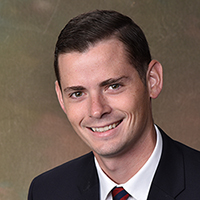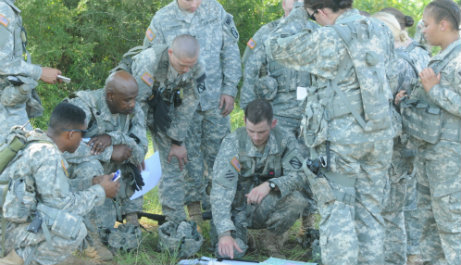Army National Guardsman Joshua Barnett J.D. '19 Looks Forward to New Career in Public Service Law
The National Conference of State Legislatures determined that between 2000 and 2012 more than 900,000 veterans of Operation Enduring Freedom and Operation Iraqi Freedom used their education benefits to attend institutions of higher learning across the United States. In a region including more than 230,000 veterans, William & Mary’s student body often includes service members looking to earn their undergraduate and graduate degrees.
 Joshua Barnett J.D. ’19 is one such student veteran. A member of the Army National Guard since 2007 who has deployed to Iraq, Barnett recently decided to trade in his helmet and uniform for the chance to earn his law degree at William & Mary Law School.
Joshua Barnett J.D. ’19 is one such student veteran. A member of the Army National Guard since 2007 who has deployed to Iraq, Barnett recently decided to trade in his helmet and uniform for the chance to earn his law degree at William & Mary Law School.
As a soldier, Barnett is a military policeman. He deployed to Mosul, Iraq, a city which is located about 200 miles north of Baghdad, in 2009 to assist in training Iraqi police forces. One evening, while Barnett and his platoon were interacting with their Iraqi counterparts, they began taking heavy gunfire from enemy forces.
“We took [machine gun] fire while at an Iraqi police station at night,” said Barnett. “I was a turret gunner in an MRAP vehicle providing cover for our soldiers who were on foot. We were never able to identify where the rounds were coming from.”
Although he was under extreme pressure to effectively return fire while protecting friendly forces, Barnett maintained his composure and contacted the Tactical Operations Center (TOC) at Forward Operating Base (FOB) Marez so that he could apprise them of the situation.
“I wasn’t only the gunner, but I also had responsibility for maintaining radio contact with our TOC back at the FOB,” said Barnett. “When we started taking contact, I had to watch my sector of fire, coordinate with our dismounts at the scene on one channel, while swapping to another channel to report what was going on as it developed. I was only 22 at the time, and it didn't seem like that big of a deal until it was all over. I didn't realize how close the rounds were impacting until they pulled some of the bullets out of my truck's gas tank and tires the next morning.”
A few years and a subsequent deployment to Kuwait later, Barnett started his studies at William & Mary and is now using his focus and ability to remain calm under pressure to better perform in this scholastic environment, he said.
“Law school is incredibly challenging, but in the best way,” said Barnett. “My veteran experience makes it easy to keep things in proper perspective. When I feel overwhelmed. I just remember that I’ve been in more stressful situations, and, if I can deal with those, I can tackle law school.”
Transitioning from military service to academia can be challenging for multiple reasons. Barnett, who was diagnosed with Post Traumatic Stress Disorder in 2012 after his second tour in the Middle East, still finds certain situations difficult, like large crowds.
“But fortunately, with the support of friends and family I’ve come a long way since then,” he said.
Another challenge that veterans can face in the classroom is a difference in culture. According to the Department of Veteran Affairs, “sometimes, core beliefs and principles learned through military service can conflict with the beliefs and principles underlying higher education. For example, following orders and respecting rank and formality may run counter to the independent thinking and informality encouraged in many classrooms.”
In addition, veterans–who are typically older and may have had dissimilar life experiences than teenage college students–can have differences of opinion with fellow students regarding social and political matters. Barnett has experienced such differences, but he said that at William & Mary those views are expressed in a respectful manner.
“Law school is a hotbed of intellectual discussion for social and political issues, and I mean that in the best way,” said Barnett. “Even if I don't always share the same ideals as others, William & Mary’s law school has a student body that is ready to discuss challenging issues openly.”
Lawrence Wilkerson, distinguished adjunct professor of government and public policy at W&M and a retired U.S. Army colonel who served as chief of staff to former Secretary of State Colin Powell, stated that veterans like Barnett often excel in college settings.
“Veterans as students often bring a more serious nature to education,” said Wilkerson. “They are committed to basically one thing: getting a better education. They are also very single-mindedly focused on that goal, and I find that in classrooms their attitudes can bring a positive mixture because other students learn from the veterans by emulating their seriousness.”
Wilkerson also encourages student veterans to not exclude themselves from social gatherings with other students because those events could build lifelong friendships.
“Do not isolate yourself on campus,” said Wilkerson. “Make friends and undertake projects together. You have much to teach each these young people about dedication, service and perseverance. Also, time to time, they might show you a thing or two, as well.”
Robert E. Kaplan, associate dean and professor of the practice at the Law School, feels that Barnett is on his way to do great things.
“Josh has a bright future as a lawyer,” said Kaplan. “Through his military experience, he will bring professionalism, maturity, compassion and commitment to his clients.”
Although Barnett just started his journey of attaining a law degree in August, he knows that it will not be easy. But with faith in himself and his abilities, he knows that he can move anything put in front of him out of the way.
“In April of 2017, I formally leave the National Guard,” said Barnett. “I think that my deployments really affirmed my personal goals of helping others. Now it’s time to help myself. I'm ready to focus on my future career as a Public Defender.”
About William & Mary Law School
Thomas Jefferson founded William & Mary Law School in 1779 to train leaders for the new nation. Now in its third century, America's oldest law school continues its historic mission of educating citizen lawyers who are prepared both to lead and to serve.
